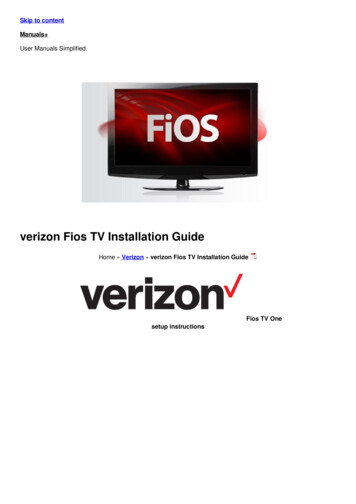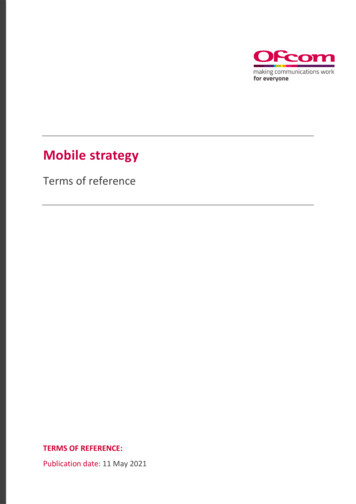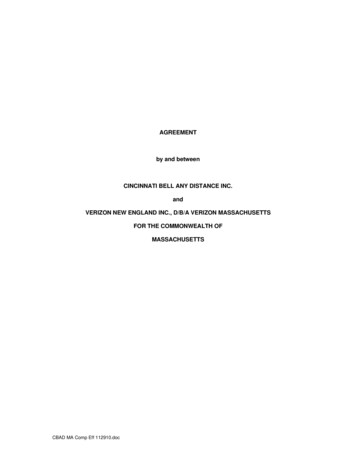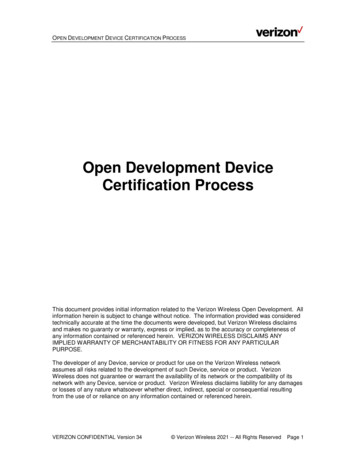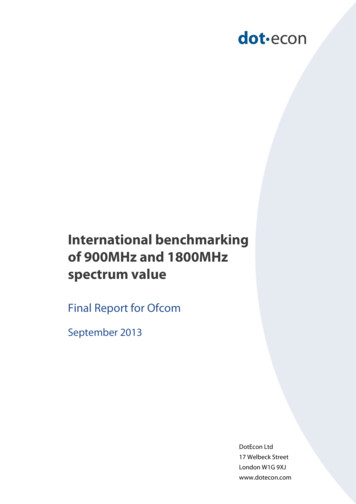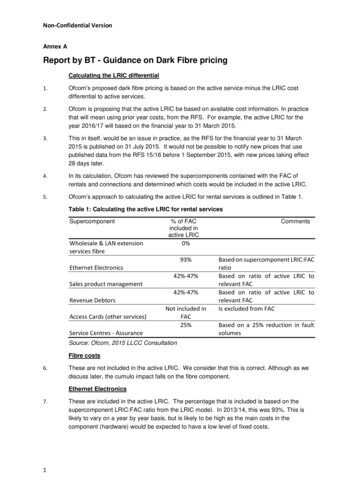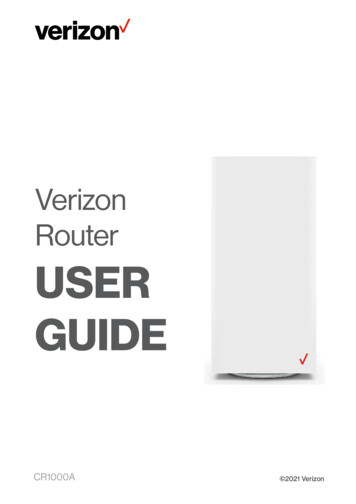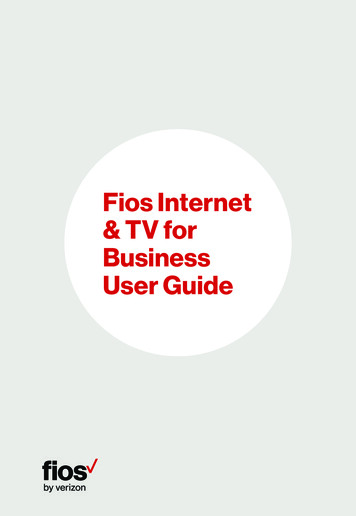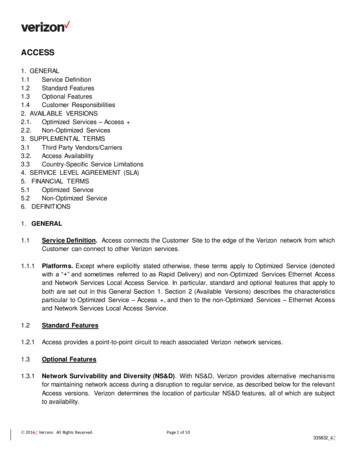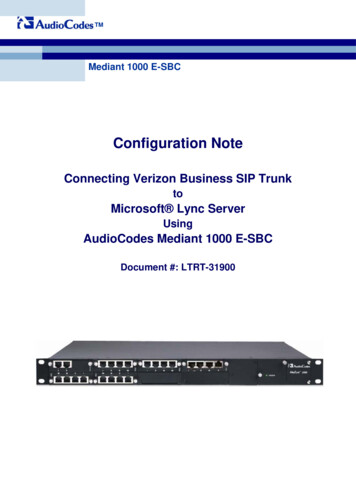
Transcription
Verizon response to Ofcom’s consultation on Wholesale Broadband Access market reviewIntroduction1. Verizon Enterprise Solutions (“Verizon”) welcomes the opportunity to respond toOfcom’s “Wholesale Broadband Access Market Review” (the “Review”).2. Verizon is the global IT solutions partner to business and government. As part of VerizonCommunications – a company with nearly 131 billion in annual revenue – Verizonserves 98 per cent of the Fortune 500. Verizon caters to large and medium businessesand government agencies and is connecting systems, machines, ideas and peoplearound the world for altogether better outcomes.3. Please note the views expressed in this response are specific to the UK marketenvironment and regulatory regime and should not be taken as expressing Verizon’sviews in other jurisdictions where the regulatory and market environments could differfrom that in the UK.Context4. Before offering detailed comments on the Review, we set out observations on thebroader context of the market from the perspective of Verizon operating in the UK.5. Outside the US Verizon is a pure business-to-business (“B2B”) provider, serving mainlylarge corporate customers (who themselves are typically regional or global in nature)and government customers. While we are not serving the mass-market, and ourcustomers are relatively small in number, they have strong buying power and demandhigh quality resilient data connectivity services for their sites.6. Without the mass-market customer base, our business model is not based on deepinvestment in infrastructure roll-out and a densification of our network presence. Ratherwe rely instead on access to third party networks.7. For a business such as ours, where we are primarily access-seekers, it is simply crucialthat we have effective choice from viable wholesale providers or regulatory accessremedies in place to ensure we can be competitive both in this market and others. Fromour perspective it is very important that Ofcom recognises this, and takes account of thedifferent forms of provider and competitive dynamics that may exist in a market, such asthe one under consideration here.Page 1 of 6
8. Unfortunately we do not consider that the Review reflects the realities for B2B providerssuch as Verizon. For the majority of exchanges where we seek access, we do not seeeither an effective choice of providers offering wholesale broadband access (“WBA”), oran access remedy that serves to compensate for this. This has direct knock-onconsequences for our ability to compete in the market, and for those customers that weserve. We explain this in more detail below, with reference to the relevant sections ofthe Review.Importance of the market to Verizon9. The WBA market is becoming increasingly important to Verizon and its customers.Material improvements over recent years in broadband quality in terms of its resilience,speed and service level agreements, mean that increasingly business customers areconsidering using broadband as a cheap and effective substitute for dedicated leasedlines, at least for redundancy purposes. We estimate that between 70% and 80% ofrecent customer bids have included a requirement for broadband access. This figure isonly likely to rise as software-defined networking solutions (which layer VPNs overpublic internet solutions) become more common, and broadband performancecontinues to improve.10. We therefore see demand strongly increasing in this market over the coming years, andthis is likely to be a trend reflected broadly across the business market. It isconsequently very important that Ofcom recognises and understands this shift inunderlying demand in the business sector and reflects it in the analysis that it carriesout.Product market11. We broadly agree with the product market as defined in section 3, and the inclusion ofcopper, fibre and cable in the same market at all bandwidths. However in relation toOfcom’s observations regarding the substitutability of leased lines,1 we would highlightthe comments above that increasingly we are seeing business customers favourbroadband at least as a back-up to leased line services. As broadband continues to1Paragraph 3.18Page 2 of 6
improve in terms of its performance and resilience, it is likely that it will ultimately cometo exercise a material competitive constraint, if it doesn’t already.12. Further we note Ofcom’s observation that, in the absence of ex ante regulation, thecommercial provision of WBA services to third parties will only occur where it is in theaccess provider’s interest, and that the extent of wholesaling activity is likely to be morelimited and/or provided on less favourable terms without regulation.2 This fits with ourexperience, where as an access-seeker we currently do not see sufficient competition atthe wholesale level for provision of WBA services. We therefore see a strong case forregulation to remedy this.Geographic market13. While we recognise the process that Ofcom has followed to determine the geographicmarkets, it does not reflect our experience of competition when purchasing WBAproducts. We are strongly concerned that the picture painted suggests that nearly theentire country (97.3%) enjoys competitive conditions whereas in reality, for thoseseeking access at the wholesale level, competition is very limited or even non-existent.14. Ofcom does not appear to have carried out an analysis of how the geographic marketswould look if they were calculated on the basis of providers present in exchanges thatactually offer a WBA product to third parties. We consider that this is a serious flaw inthe assessment as it overlooks the needs of access-seekers who (as explained above) arenot in a position to invest in network roll-out.15. Our customers often require broadband access to be provided at a large number ofsites– for example a large retail chain may have hundreds of locations including retailstores, offices and supplier sites. In looking to fulfil this demand we will look at theviable choices available to us at each location.16. Typically we face a choice of only two providers – namely BT and TalkTalk. Indeed insome locations only BT is able to offer a service, so there is no choice at all. Ourexperience is that TalkTalk is the only carrier who are able to offer a degree of flexibilityon the pricing and the solution. BT tends to have a standard pricelist for their productwhich would be the same for all carriers regardless of size. Of the other providers thatOfcom identifies as “principal operators” (“POs”), none are currently offering a WBA2Paragraph 3.7Page 3 of 6
product to our knowledge. We do not have any visibility into whether Sky has a suitablewholesale product, let alone whether they would be willing to offer it on appropriateterms. As far as we are aware Vodafone do not have a wholesale product available yet,although we are in talks with them, and the position is the same with Virgin Media.17. So whereas Ofcom identifies five possible POs, in reality for us in most cases we are onlyable to request WBA from a choice of two. Such a scenario seems more akin to theconditions that Ofcom identifies in Market A, namely “exchange areas which are BT-onlyor BT 1PO”. We therefore see a strong distinction between the competitive conditionsthat Ofcom identifies and the nature of the competitive choice that we see in ourposition as an access-seeker.18. Where this limited choice exists, and especially where BT is the only provider to thirdparties, there is the potential for competition to be distorted. Ofcom seems to recognisethis as it imposes SMP remedies to counter the effects of reduced competition in MarketA (where the number of providers is very limited). This is exactly the situation that weface on a national basis. We therefore consider that there is a strong case for the marketreview to take account of this fact and ensure that access-seekers such as Verizon areable to rely on properly regulated services beyond the very small geographic areaidentified as Market A.Market power assessment19. Ofcom states at paragraph 5.34 that “[g]iven the number of POs present in Market B andtheir wide coverage, any potential buyer of WBA services has several potential suppliersfrom which it could seek access. This will give buyers some degree of negotiating powerwhen seeking to obtain access.”20. It is not our experience that there are several potential suppliers. There seems littleinterest from providers other than BT and TT to engage in a pro-active discussion aboutWBA services and currently our options are highly limited. We do not see any evidencethat Ofcom has properly investigated this in its Review. What we would therefore like tosee is a regime which encourages other providers to engage in the wholesale marketand provide a meaningful competitive constraint to BT.Fibre rollout21. In order for BB to constitute an effective substitute for dedicated point to point services,and realise the significant cost savings that this can bring, our customers need reliablePage 4 of 6
high-speed performance. This can be achieved using fibre-to-the-cabinet (“FTTC”), and itwould be hugely beneficial if we were able to offer FTTC-based services to ourcustomers on a wide-ranging basis. However the fact remains that FTTC coverage is stillvery patchy, and we take the opportunity to re-state our concerns about this (which wepreviously raised in our response to Ofcom’s Narrowband Market Review consultationearlier this year).22. Our core concerns are as follows: Openreach cherry-picks easiest to reach areas or those favourable to BT Groupfirst and coverage is therefore still very patchy. We have responded to a numberof large UK multi-site RFP s where the bandwidth requirement is 10mb and theavailability of FTTC for those sites will vary between 35 – 55%. Openreach fails to be fully transparent in its costs and deployment plans.Therefore a patchwork of areas still not served (rural and non-rural), and there isinsufficient information about plans for those areas still not covered.3 Lack ofdeployment information in turn stifles local competition as BT’s competitors fear“overbuild” by Openreach and provide no alternative. Business Parks on the edges of large towns have often been “missed” by roll-out(BT can charge businesses higher prices for expensive leased lines and has noincentive to roll-out FTTC here). There is a large degree of dissatisfaction from SMEs on internet speeds (29%according to Ofcom’s own research4).23. Ultimately we cannot serve our customers with what they want, or give them anycertainty on when the outlook will improve. BT has autonomy on how it conducts theroll-out. This not only makes it harder for us to ensure we deliver the best for ourcustomers, but also limits the types of solutions we can offer e.g. VoIP.Conclusion24. The demand for WBA services across our existing and future customer base is increasing.As a B2B provider with no commercial incentive to invest in significant network roll-out3BT insisted on confidentiality clauses with local government to prevent disclosure of its implementationprogramme.4Ofcom, January 2017, The SME experience of communications services: research report,https://www.ofcom.org.uk/ data/assets/pdf arch2016-Report.pdfPage 5 of 6
we are primarily an access seeker for WBA across the UK. This is likely to be the case forother providers serving the business sector.25. We do not see that Ofcom has fully considered the competitive conditions facing suchaccess seekers in the Review. If it did, based on our experience, we would expect it todiscover that in fact the choice available is very limited and terms and pricing are likelyto be less favourable. We would also expect it to see a need for regulatory remediesbased on its analysis for Market A (where choice is similarly limited). We wouldtherefore urge Ofcom to take this into account in considering how to regulate thismarket.Verizon Enterprise ServicesSeptember 2017Page 6 of 6
Ofcom's "Wholesale roadband Access Market Review" (the "Review"). 2. Verizon is the global IT solutions partner to business and government. As part of Verizon Communications - a company with nearly 131 billion in annual revenue - Verizon serves 98 per cent of the Fortune 500. Verizon caters to large and medium businesses
